If I ever summed-up the amount of hours spent playing each game (thus acknowledging my addiction) and then arranged the totals in descending order, Mass Effect would top the resultant list. Between four games, multiple playthroughs per and ME3's multiplayer, I shudder to think how much time I've devoted to said franchise (but we're talking ballpark figures in which a competent carpenter could finish a small house). I guess what I'm trying to say is – where Mass Effect is concerned – I'm a fan.
But mere fandom is not enough to blind a game-reviewing pig from seeing the flaws in an otherwise appealing whole. If anything, it makes 'em easier to spot — which is handy, because reviewing the Mass Effect games is what I'll be doing from the next paragraph on. Off we go. Whee!
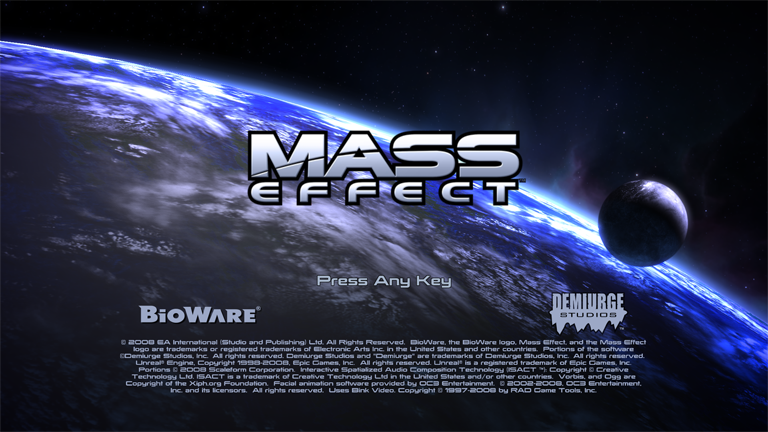
Mass Effect 1
What a promising spark.
2007's Mass Effect was a breath of fresh air in an otherwise stagnant field. The idea of proper action RPGs was as-yet ill defined (with the majority of claimants to the genre leaning hard in favor of the "action" part), proper-RPGs were more concerned with stats and rolls than dialogue, RPG world-building was almost always rooted in a fantasy setting and, outside of Star Wars, nobody was eager to set foot in an original science fiction universe. Mass Effect changed all that.
With cinematographic direction and visuals, vast open spaces, a brazen defiance of strict adherence to genre boundaries, varied gameplay elements, solid mission design and good writing, it was – in many ways – more akin to a Hollywood production than a mere computer game (which, on a 3M USD budget, it probably should have been).
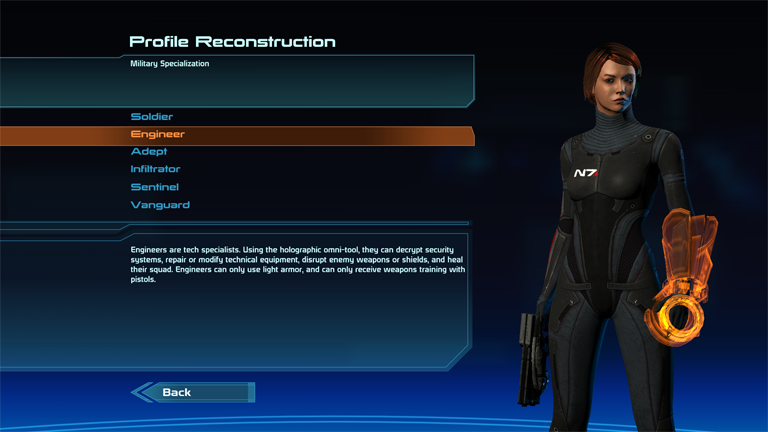
In the game, you were cast as Commander Shepard: a human Alliance soldier with a penchant for results tasked with investigating what a rogue Spectre got up to (Spectres being special-agent types used by an interspecies, galactic ruling body called the Citadel Council for deniable dirty work).
Shepard could be male or female, have one of three pre-service histories (basically Origins before DA:O did it properly); one of three psychological profiles (defining characteristics of your military service to date); one of six Specializations (classes, which determined your skills and what weapons you could use), Talents and Abilities (skills, which granted % bonuses in-game and, um, abilities, which could be used to perform special attacks during combat).
Your history and profile didn't play as much of a part as they later would in DA:O (you basically got one extra quest out of 'em on top of sporadic little dialogue nods), but they were a neat detail that let you shape your Shepard's backstory a little. They also gave a slight morality bonus to your character, which was part of a (sort of) new gameplay element.
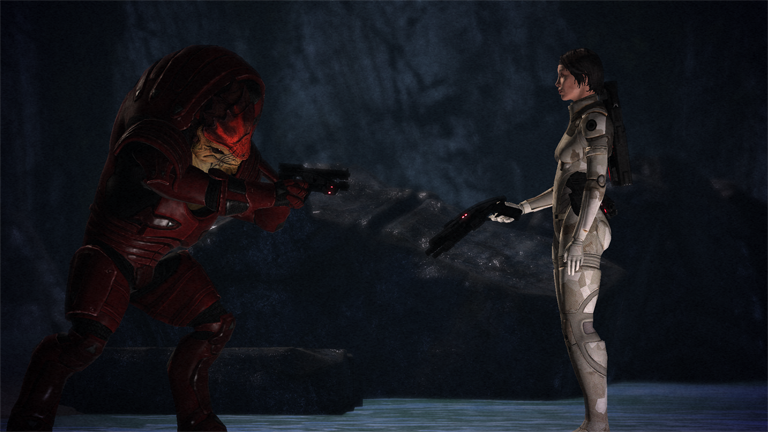
Much like KOTOR before it, Mass Effect included a binary morality system. Do something good, and your Sheperd got rewarded with blue, Paragon points; shoot someone in the face, mid-conversation, and you got naughty, red Renegade points (instead of leaning towards the light or dark side of the force). Accumulating enough of either opened new conversation options later in the game. Seems like a no-brainer now, but it was revolutionary for its time.
The gameplay, on the other hand, was anything but. Mass Effect was effectively (heh) a 3rd-person shooter with a walking simulator, oodles of branching dialogue, a hacking mini-game and a driving component tacked-on.
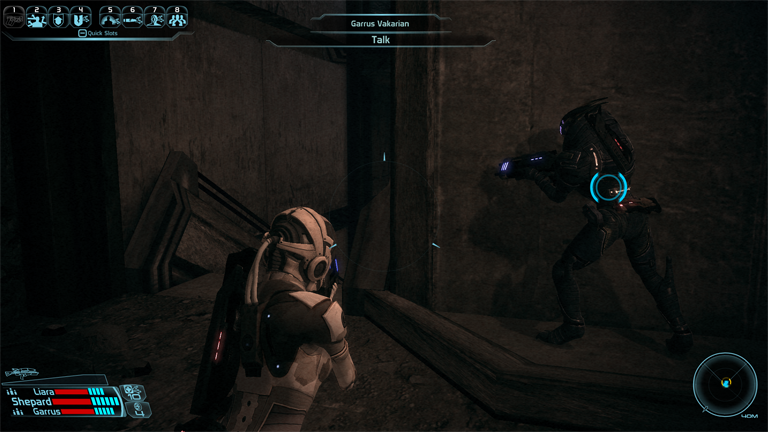
The shooting was okay, with guns that overheated instead of running out of ammo and special abilities to break the tedium. But opponents mostly charged straight at you, hiding behind cover was an as-yet unrealized dream and your highly trained Alliance soldier operated with all the grace of Doomguy from 1993.
The dialogue, while competently written, was a little preachy (in the oratory sense), with most conversations devolving into one-sided monologues with one character venting and the other their captive audience until the torrent ran its course.
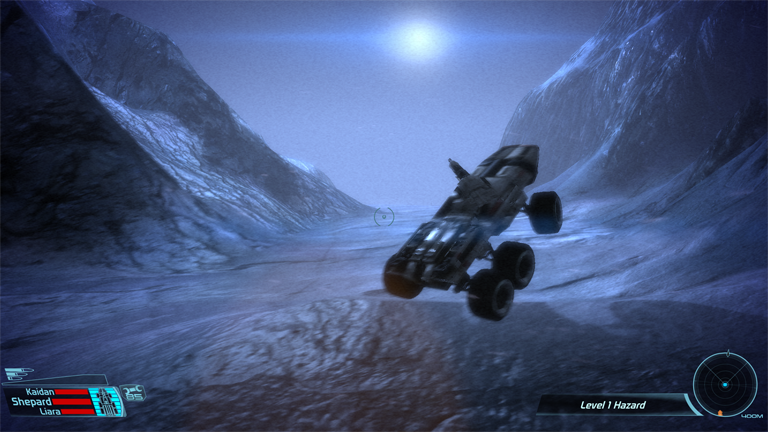
And the driving, in of itself, was okay, except – outside of plot missions – there was nowhere interesting to drive to, with side-mission planets composed of empty topography sprinkled with the same, old recycled assets and a bare vestige of narrative.
No — where Mass Effect really reeled you in was with clever mission design and the plot.
Remember the feeling of freedom in KOTOR when you first took off in the Ebony Hawk and realized you could go wherever you wanted? That was Mass Effect's main appeal... Well, that and the fact that you got to enjoy the companionship of a crew that was actually interesting. Between grumpy Garrus, larger-than-life Wrex, naive Liara, adventurous Tali and the two boilerplate humans, your crew had things to say, opinions to offer, quips and quirks aplenty and backstories galore. Finding out more about them, or getting them to open up and trust you, was as much of ME's core appeal as the overarching plot (which was clever without being brilliant).
As for mission variety, while the majority eventually involved shooting, the game did its due to throw in interesting elements with no small regularity. So while, in one scenario, you might have been shooting clones while climbing around a giant carnivorous plant, in another, you might have been expected to dodge mines in the Mako (your bouncy APC of choice); or throw gas grenades at brainwashed colonists (to avoid having to kill them); or explore a spooky, trap-laden derelict ship. Nothing radical, but it did differentiate your outings just enough.
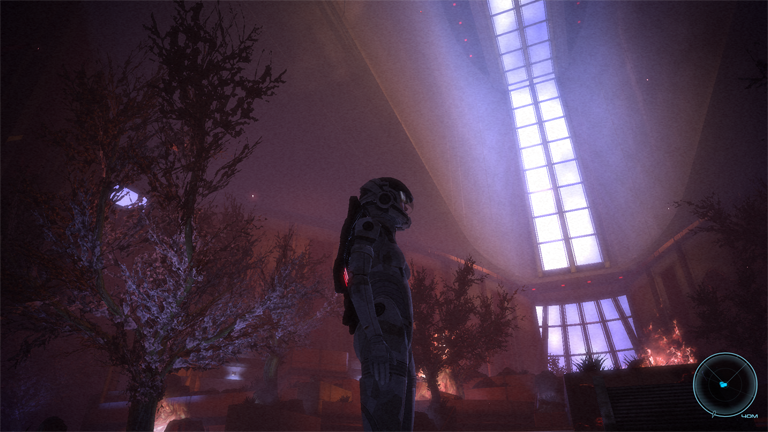
The one part of the gameplay ME did exceedingly well (and that none of the following games managed to replicate) was the grand sense of awe and scale. The environments were so massive that it made you feel like an insignificant part of a larger world; and the scenery so varied that – between lava fields, frozen wastelands, gigantic space stations and claustrophobic derelict ships – it really felt like you were exploring someplace new and unknown...
The plot flowed well, the characters (though a bit nascent) were eminently likeable, there was enough "choice" to let you feel like you were making the story your own, and while the individual gameplay elements were a little rough around the edges, they made for a cohesive and enjoyable experience. In the end, you beat the bad guy, saved the day and... died?
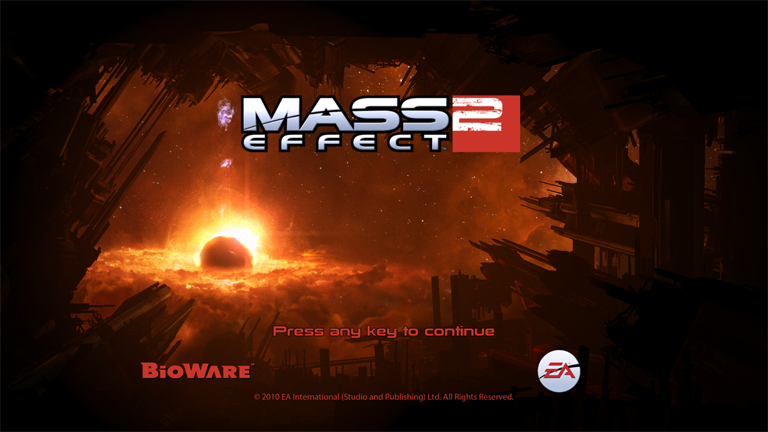
Mass Effect 2
What an upgrade.
While starting the game by killing its protagonist may have seemed an odd choice, Mass Effect 2 was bold enough to pull it off. By far the best game in the series, where ME1 was a little stilted and naive, ME2 was determined to be darker, grittier and not pull any punches. Branching choices were honed to a razor's edge, dialogue interrupts made conversations more dynamic, sticky cover and scarce ammo intensified combat while still keeping it tactical, and mission design was at an all-time high.
This time, Shepard and crew were going full counter-culture – allying themselves with a humanity-first black-ops group who had the resources to get things done and didn't mind breaking the rules along the way.
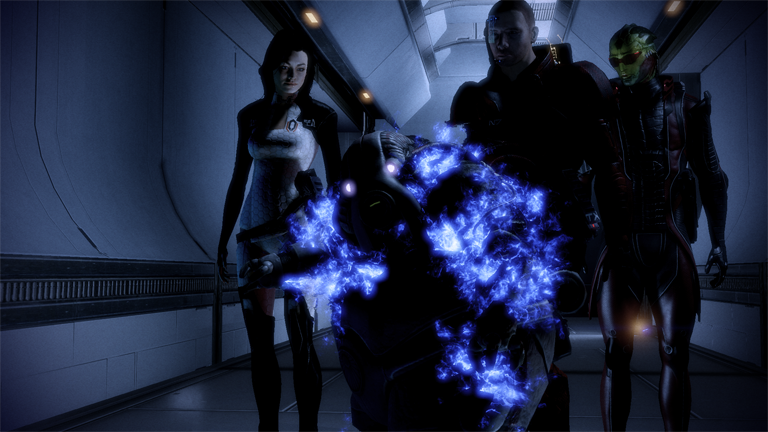
The graphics engine got an upgrade, the music was sonorous and inspiring, the cast of characters was more edgy and fully-realized and while the vast sense of scale took a hit (the game going back to smaller, but more densely populated, environments), the overall effect was stunning.
In terms of gameplay changes, ME2 got rid of open-world driving, replacing it with a few vehicular levels, which only happened in missions during the Firewalker and Overlord DLCs. As, previously, the Mako could be deployed at will, but didn't really have anyplace to go, it was not that big of a loss.
The bypass mini-game from ME1 got a facelift and some company in the form of a hacking and planet scanning (which was part of a new Research feature).
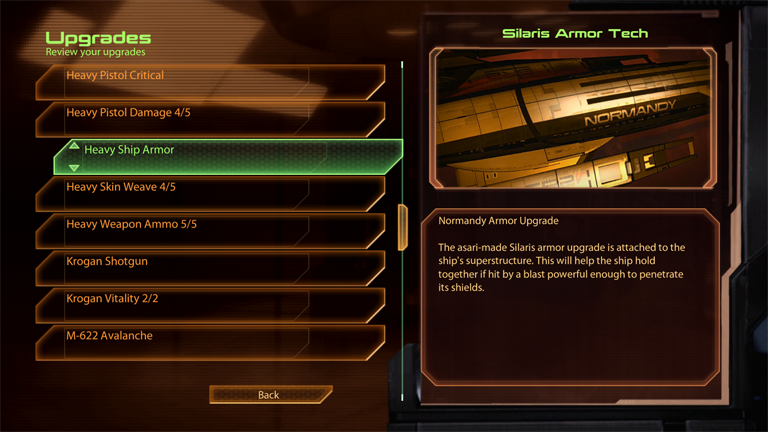
Research had two distinct elements: finding resources (for doing research) and then – y'know – researching. To find resources, you had to fly to a planet, scan it while keeping an eye on corresponding graphs and then – when a graph for a particular element spiked high – send down a probe to mark the location (which netted you an amount of the resource). Once you had enough resources, you could spend them on research (which improved weapons and armor, teammate abilites or even affected how the plot panned out towards the end).
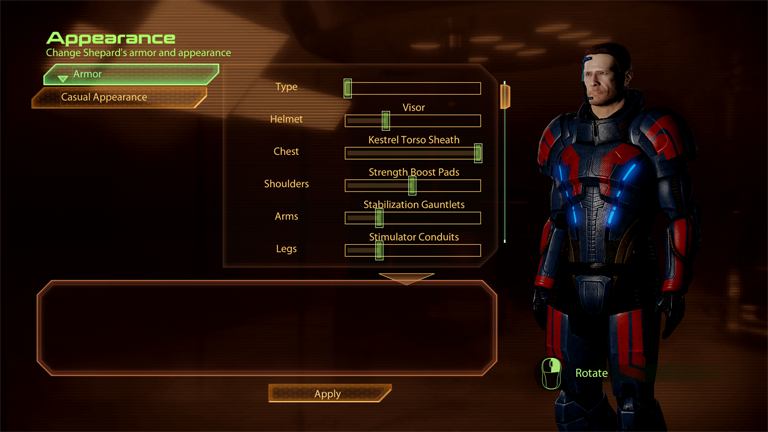
Armor was revamped, with basic N7 suits now composed of four separate pieces (helmet, cuirass, arms and legs) that could be mixed and matched for optimal bonuses and special, one-piece suits offering bonus sets. Shepard also got heavy weapons to bolster their arsenal. While they didn't carry too much ammo and were not truly overpowering, they offered fun ways to conclude engagements or turn crucial pivot points into victories (nothing like seeing a clump of grunts sucked into a black hole to brighten your day).
In terms of level design, the game was fantastic, but mission design became more streamlined in favor of shooting. Every now and again, there'd still be outliers to surpise you (like tip-toeing around a wreck perched on the edge of a chasm, chasing a cab through a stream of flying cars, or battling rogue robots in a sandstorm), but – for the most part – ME2 was more keen to embrace its shooter heritage than explore new mission types.
Overall, ME2 was the most coherent experience of the series, with choices that mattered, characters you cared about and a plot that made sense. You finished your suicide run, snuggled up with your beau in the captain's quarters and thought that, just maybe, there was light at the end of this nightmare tunnel you've been thrust into...
And then it all went to pieces.
Mass Effect 3
What the fffff- !?
Before I write anything else, let's get to the elephant in the room: Origin. By ME3, Electronic Arts finished its acquisition of Bioware and went from being a publisher to having influence on development. And it showed. For starters, they put the game behind a middleware wall (you had to install their Origin client to even run ME3) and, generally, given any fork in the road, made mostly wrong turns.
To be clear, ME3 is not a bad game. On the contrary: squint at key moments and it's quite the enjoyable ordeal. You get to see familiar faces once again, enjoy many well-crafted set pieces and get closure for many threads. One thing you do not get, however, is a return on investment.
For a franchise built on meaningful choice, ME3 was sure quick to redact a lot of your decisions. Say you saved the Rachni queen, giving the race a chance at redemption, in ME1. In ME2, you are visited by her emissary who lets you know their recovery is going well and that they will be ready to help you in the conflict to come... Well, if you were hoping to see a Rachni fleet at the trilogy's end or having them help in any meaningful way, ME3 was there to give you a big, fat middle finger. The Rachni were relegated to a single level (where you shot at them) and then dismissed as a meaningless number on an equally meaningless score board.
And this didn't happen once: it happened to pretty much every decision you'd made.
Spared Aresh on Pragia? He's a line in an email now. Let Kal'Reegar bite the dust? No email for you. Saved the Feros colonists? Have 30 points. Didn't visit Grissom? There's a Phantom with Jack's name on it... ME3 took a massive side-step to everything leading up to it and sorta re-invented the narrative. Whereas the past two games lead you to believe you were working towards an actual, viable solution, here it turned out that putting old grievances to rest and uniting all of the galaxy was pointless, silly: no matter your numbers, you were simply outmatched. But — fear not! For there existed a Magical Bullsh- I mean Plot Device you could simply switch on and solve the threat to the entire galaxy. Just put it together and – poof! There goes all of your investment to date...
ME1 may not have known where it was going, exactly, but it had the gumption to try and get there in style. ME2 was the complete package, with a beginning, an end and a point to it all... ME3, on the other hand, was just– Lazy.
Full of solutions so contrived they'd make a six-year-old groan, it plotted a linear, pre-determined course with the only real lesson being that – no matter your efforts – some things are just unavoidable. Hardly the conclusion to a trilogy built on player agency and open-ended gameplay.
Oh, sure – the shooting in ME3 was the most mobile and fun it's ever been (which, given that EA bundled the game with microtransaction-laden multiplayer, it sorta had to be); and the gun variety was more extensive than the first two games com- Bined... Hmm. Now that I think about it – what with the strong "us vs. them" overtones, suddenly not being allowed to set foot into toilets of the opposite sex on your own ship, people structuring Sheperd's movements as it they were a rank-and-file grunt instead of the one person saw trouble coming and stopped it – twice... For a game made by a Canadian studio, ME3 sure had a real strong "USA! USA!" vibe coming off it...
On top of the iffy writing and decision denial, the game was also rife with recycled content. Objects, environments and even animations paled in comparison to the amount of work invested in the previous two games. Everything felt watered-down, tawdry and cheap. In ME2 I could stare for hours at a door on Omega grinding open and shut, sputtering oil on the ground... In ME3, even the grandest set-pieces felt like budget productions (and that's before we get to missing audio in the final moments of the game, misaligned animations and hilarious Aria-snaps which were bound to give the poor lass whiplash).
On the plus side, you got to spend more time with your favorite characters – and even throw them a party (thanks to the fabulous Citadel DLC). And, on the whole, the core missions and even most of the DLCs were pretty well done (Leviathan being all atmospheric and spooky; Omega — fun; From the Ashes, yeah, kinda meh). But nothing you did mattered, which was a sad way to end what could have been an epic spacefaring saga.
At the end of the day, I'm glad ME3 was made and it did offer a few genuinely heartfelt or otherwise worthwhile moments... But the production value was middling, at best (especially in contrast to the hyper-polished ME2) and the conclusion fell flat on player expectations. ME3 was the ending we got – not the ending we deserved...
Or was it?
Mass Effect: Andromeda
What-ever...
Now that Mass Effect was a bona-fide, EA cash-cow, its corpo overlords could hardly let it lie. Take everything bad I've said about ME3, paste it into a coherent, competent plot that has nothing to do with the ME trilogy, sprinkle in the most wildly ranging production values ever (I'm talking a scale that ends with "competent" but starts at "my cousin did it for free") and add too many characters with too much to say about nothing – and that's Andromeda in a nutshell.
By moving the game world to a parallel track away from pretty much anything you may have liked about Mass Effect, save for the key world building elements, EA made Andromeda have to stand on its own merits — which, given their spotty record with ME3, was a monumental mistake.
They left the open-world driving, added their pattended "Ubisoft did it", Lots of Pointless Things on a Giant Map approach to "gameplay" (because, hey, it worked so well in ME1); left the shooting (of course) with Even More Guns; and gave you a new ship, a new crew and a new galaxy to explore...
But the plot, while serviceable, was throwaway; the characters, while interesting enough, were boilerplate; the antagonists, while eminently shootable, seemed mundane by comparison to their forebears... And, honestly? Nothing in the game ever hooked you the way ME1 or ME2 did.
Andromeda is not a bad game. It is not a good game. It merely is.
The one exception to the doldrums are some of the loyalty missions, which show a glimmer of promise and are a head and shoulders above the production quality that you experience in the remainder of the game. That aside, though, I simply cannot think of a reason to recommend it (short of "it's more Mass Effect... kinda").
With a rumored fifth game in the series seeming to focus back on Shepard, Liara and the old Normandy crew, it doesn't look likely that Andromeda will get a follow-up, which — yeah, I actually don't mind.
But all of that is a moot point, because chances are the real bad guys of the Mass Effect universe won't let you play whatever it is, anyway.
Electronic Arts
Worse than Reapers.
When EA forced players to install Origin or miss out on, what turned out to be, not that great a conclusion to a favorite franchise, I admit – I caved. I was invested already – I wanted to see the story through to its completion... And, yeah – okay: I'd pre-ordered.
Other than a brief bout of Steam-madness (to play Borderlands with a certain Tanuki), Origin was the only middleware I had on my computer for any length of time, which – for a pig violently opposed to any middleware anywhere – was kind of a big deal. Then, yesterday, I wanted to put in some time on my second-to-last Sheperd. Origin wanted an update. I updated it.
A pop-up informed me Origin was no longer a thing and I had to download the "EA App" to have access to a game I spent money on and had played, on and off, for eleven years. And that was sorta the last straw.
Not only did I not download their app – I uninstalled Origin, ME3 and Andromeda... Which pains me a little, if I'm honest. I was close to finishing my decade-long playthrough of, lets say, many Shepards, which I will now never get to do (unless EA comes to their senses and releases the trilogy on GoG – which seems unlikely — not to mention uncharacteristic).
But games are entertainment and principles matter... At least, that's what I tell myself staring at the gap on my desktop left by shortcuts that were there for a decade and change...
Conclusion
If you enjoy space opera, but wish it wasn't synonymous with Star Wars; like some of chat with your gunfire; wish you had the freedom to roam the stars on your very own ship; or simply want a deep story with a lot of likeable characters, I can't recommend the Mass Effect trilogy highly enough. While devs keep trying to duplicate its success (as with The Outer Worlds or Bethesda's upcoming Starfield) I have yet to see a pretender worthy of toppling the Genuine Article (and, seeing as how Bioware-that-was no longer exists and Obsidian is now a Microsoft lackey, I probably never will).
As for Andromeda, I can only think of two groups of players that would enjoy it: either ones with no previous Mass Effect exposure, or ones so hardcore the brand alone is enough to overlook its shortcomings. For everyone else, give that particular spaceship ride a miss.
